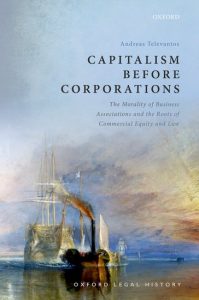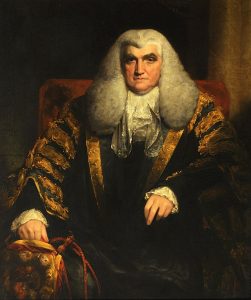 We in the Centre for Law and History Research enjoy nothing more than curling up with a good book! For our first post this year, we caught up with another legal historian, Andreas Televantos (University of Oxford), whose book Capitalism before Corporations: The Morality of Business Associations and the Roots of Commercial Equity and Law (OUP 2020) recently won the SLS’s Peter Birks Prize for Outstanding Legal Scholarship. Our roving reporter went to find out more…
We in the Centre for Law and History Research enjoy nothing more than curling up with a good book! For our first post this year, we caught up with another legal historian, Andreas Televantos (University of Oxford), whose book Capitalism before Corporations: The Morality of Business Associations and the Roots of Commercial Equity and Law (OUP 2020) recently won the SLS’s Peter Birks Prize for Outstanding Legal Scholarship. Our roving reporter went to find out more…
Andreas, congratulations on winning the Peter Birks Prize! Can you tell us a little about your book?
Thanks! The book examines how businesses in the Regency era were able to make use of the basic building blocks of private law to create business organisations, at a time when it was not normally possible to create a commercial corporation to trade within the UK. More broadly, it looks at the moral and legal questions that cases concerning such entities raised—and so situates what appear to be technical legal rules within broader contemporary political, economic, and religious thought about business and morality.
What first got you interested in the history of corporations?
I never actually studied corporate law as an undergraduate! It was actually when doing some pro-bono work involving a partnership which got me thinking about how the law treats businesses. At the same time, I really enjoyed trusts and legal history, and those interests ultimately ended up converging.
Lord Eldon makes frequent appearances in your book, and he sounds like a controversial character! Can you tell us about him?
 Lord Eldon, John Scott, was Lord Chancellor in England in the early nineteenth century. He was the son of a coal merchant from Newcastle who rose through the ranks to become one of the most important legal and political figures in early nineteenth century Britain. He eloped with his wife to marry her and in the eighteenth century used to hang around the University College Common Room as part of the same social group as Samuel Johnson. He was phenomenally influential in his own time, and modern equity too owes much of its shape to Eldon’s judgments.
Lord Eldon, John Scott, was Lord Chancellor in England in the early nineteenth century. He was the son of a coal merchant from Newcastle who rose through the ranks to become one of the most important legal and political figures in early nineteenth century Britain. He eloped with his wife to marry her and in the eighteenth century used to hang around the University College Common Room as part of the same social group as Samuel Johnson. He was phenomenally influential in his own time, and modern equity too owes much of its shape to Eldon’s judgments.
That being said, there is a much darker side to Eldon and his legacy. Politically he was a reactionary—he resisted Catholic emancipation and he opposed the immediate abolition of slavery—ultimately only caving due to his personal friendship with William Wilberforce. As a judge too Eldon was famously dilatory—think Bleak House. Hearing cases in his court was slow and expensive, and he opposed all efforts to reform them—and took any suggestion that reform was needed as a personal insult.
It’s great to see a legal history book winning such a prestigious prize. Why should modern lawyers care about legal history?
When doing modern law there is sometimes a danger of seeing the law as ‘flat’—as seeing the legal rules today as a monolith, existing as if all created at the same time. That can make it very difficult to make sense of the law—in particular it can make it hard to see that legal rules don’t function in isolation, but form part of a system. It’s often easier to understand and solve modern legal problems by taking a historical perspective, by seeing why and how the rules evolved in the first place.
Why is the jingle rule called the jingle rule? It sounds very Christmassy.
It’s a rule of partnership bankruptcy I’m afraid, which wouldn’t make for a very fun Christmas.
Historically, the rule provided that partnership creditors could claim business assets in priority to the personal creditors of the partners, and personal creditors of partners could claim their personal assets in priority to the partnership creditors. In England and Wales today, only the first part remains good law.
Allegedly the phrase was coined by the American Jurist James Barr Ames. Ames thought that partnership law didn’t really make any sense. He said the rule was like a ‘jingle’, as in an advertising jingle—memorable because of its symmetry, but hard to justify or explain. Ultimately, he argued that partnership law was really an instance of the common law breaking its own rules to recognise something like a corporation. One of the arguments in the book (and in a forthcoming modern law piece of mine in the LQR) is that it is possible to explain priority given to business creditors under the ‘jingle rule’ through orthodox legal analysis.
Your introduction name-checks Bleak House, Dombey & Sons and The Way We Live Now. Do you have any more book recommendations for us?
The book I read most recently that I really enjoyed was David Copperfield—which is so vivid I couldn’t put it down. It has romance, dramatic deaths, cruel school teachers, a boat turned into a house, several insolvencies, and a sycophantic villain who carries out his scheme by fraudulently altering trust and partnership accounts. What’s not to love?
Sounds perfect for a rainy winter’s day! And if you want to read more about those partnerships, you can find out about Andreas’s book here.
